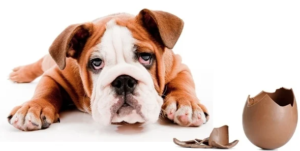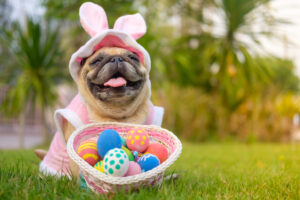Don’t share your meal
Unfortunately, most of our favourite Easter treats are dangerous for our dogs. Some of these foods, like  chocolate bunnies, are toxic for dogs. Other Easter foods may be dangerous because they’re usually prepared with ingredients that are toxic for dogs, like onions or garlic. Other Easter snacks have high levels of salt or sugar, which can upset your dog’s stomach and aren’t healthy for them to eat.
chocolate bunnies, are toxic for dogs. Other Easter foods may be dangerous because they’re usually prepared with ingredients that are toxic for dogs, like onions or garlic. Other Easter snacks have high levels of salt or sugar, which can upset your dog’s stomach and aren’t healthy for them to eat.
Some common Easter foods you should keep away from dogs include:
- Deviled eggs
- Ham
- Cookies
- Cakes
- Chocolate eggs
- Candy
- Mashed/twice-baked potatoes
- Carrot cake
- Green beans, if prepared with butter or spices (plain green beans are safe to share with your dog)
Watch your glass
Many families enjoy having a drink at Easter but it’s important to not let your dog have a sip. Alcohol is toxic to dogs. Make sure that you and your guests don’t leave glasses containing alcohol on low coffee tables, on the floor, or anywhere else your dog can access it.
Easter Egg Hunt Dangers
Easter egg hunts are fun for kids and families. But it’s a good idea to prevent your dog from getting involved. The energy of children running, laughing, yelling, and racing to grab eggs can be overstimulating for many dogs, who could begin to chase Easter egg hunters. Dogs may also grab eggs themselves. The excitement of the hunt could trigger resource guarding from dogs that might not want to relinquish the eggs they find.
The primary safety issue of Easter egg hunts for dogs is the plastic eggs, and everything put inside them. Dogs can grab and open the eggs, possibly chewing or swallowing the plastic, which could cut their mouth or cause an obstruction. Hidden chocolate and candy in Easter eggs can be especially harmful. Easter eggs also often come with small plastic and rubber toys which, if ingested, could be hazardous to your dog. It’s best to keep your dog away from any egg hunts by keeping them on a leash or in another area of your home.
If you’re hosting an Easter egg hunt, keep track of all the places where the eggs are hidden. Once the event is over, be sure to double-check that all the eggs have been found. Ensure that none have been left where your dog can find them or sitting out at a level where your dog can reach. Before letting out your dog, check your yard for any candy wrappers that may have accidentally been discarded. Foil from around chocolate bunnies and plastic candy wrappers may attractive to dogs, but it isn’t digestible.
Avoid Easter Lilies
Easter Lilies are beautiful but they shouldn’t be brought into homes with pets. Lilies are very popular gifts during the Easter season. But they’re highly toxic to cats and dogs and can lead to kidney failure.
Dog Easter Basket/Hunt
There are safe and enjoyable ways to involve your dog in the Easter festivities. You can make your dog their own Easter basket to open on Easter morning (with help and supervision). Easter basket treats perfect for dogs include festive toys and treats, as well as bandanas or outfits for the day.
Creating your dog’s own  Easter egg hunt is a fun way to include them in the holiday. Hide small pieces of your dog’s favourite treats or toys around a room in your house, or in a fenced yard. Once you’ve hidden toys and treats, encourage them to start searching. Then, praise your dog as they find each hidden treat or toy. You can also use plastic Easter eggs to hide treats or scents (if you train in the sport of scent work) that your dog will search for.
Easter egg hunt is a fun way to include them in the holiday. Hide small pieces of your dog’s favourite treats or toys around a room in your house, or in a fenced yard. Once you’ve hidden toys and treats, encourage them to start searching. Then, praise your dog as they find each hidden treat or toy. You can also use plastic Easter eggs to hide treats or scents (if you train in the sport of scent work) that your dog will search for.
If you’re going to hide treats or scents in plastic eggs, keep track of where all the eggs are hidden. Closely monitor your dog while they’re searching. Once they find the egg, you can open the eggs and give them the treats inside or reward them if they find the scent inside.

